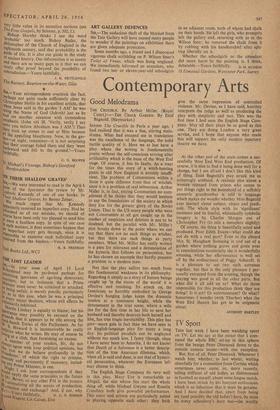Contemporary Arts
Good Melodrama
THE CRUCIBLE. By Arthur Miller. (Royal COUrt.)—THE CHALK GARDEN. By Enid Bagnold. (Haymarket.) SEEING The Crucible in Paris a year ago, I had realised that it was a fine, stirring melo- drama. What had escaped me in translation was the excellence of the language, the solid tactile quality of it. Here we at last have a play where the writing is fundamentally poetic without the self-conscious striving after artificiality which is the bane of the West End stage. Of course, it has its faults. As a tract for the times this story of a witch-hunting panic in old New England is notably insuffi- cient. The problem of Communism within a State is quite different from that of witches, since it is a problem of real subversion. Arthur Miller is, in fact, paying Communists no com- pliment if he thinks that they would hesitate to sap the foundations of the society in which they live for the greater glory of the Soviet Union. That in the US many people who were not Communists at all got caught up in the meshes of suspicion and deletion is not to be doubted, but the parallel with Mr. Miller's plot breaks down at the point where we can say that there are no such things as witches, but that there are such things as party members. What Mr. Miller has really written is a plea for tolerance and a denunciation of the hysteria that follows on persecution, but he has chosen an example that hardly presents a problem to a modern man.
Not that the play suffers too much from this fundamental weakness in its philosophy. Regarding it simply as a story of human beings caught up 'in the storm of the world' it is effective and touching. Its attack on, the fanaticism so horribly embodied in George Devine's hanging judge keeps the dramatic tension at a consistent height, while the denouement in the trial scene, where a wife lies for the first time in her life to save her husband and thereby destroys both herself and him, has true tragic inevitability. This play has guts—more guts in fact than we have seen in an English-language play for many a long day. Its political parallels can be neglected without too much loss. I fancy (though, since I have never been to America, I do not know) that Death of a Salesman is a better descrip- tion of the true American dilemma, which, when all is said and done, is not that of hysteri- cal persecution, whatever the European left may choose to think.
The English Stage Company do very well in this play. Mary Ure is remarkable as Abigail, the slut whose lies start the whole thing off, while Michael Gwynn and Rosalie Crutchley both give powerful performances. This actor and actress are particularly suited to playing opposite each other: they both
give the same impression of controlled violence. Mr. Devine, as I have said, horribly interprets the judge as well as producing the play with simplicity and tact. This was the first time 1 .had seen the English Stage Com- pany. May all their plays be as good as this one. They are doing London a very great service, and I hope that anyone who reads this will support the only modern repertory theatre we have.
At the other end of the scale comes a suc- cessfully West End West End production. Of course, it is nice to find it being done well for a change, but I am afraid 1 don't like this kind of thing. Enid Bagnold's play struck me as irritatingly artificial. A realistic plot about a woman released from prison who comes to put things right in the household of a selfishly eccentric grandmother is told in language which makes me wonder whether Miss Bagnold ever learned about subject, object and predi- cate. The whole style with its 'significant' moments and its fearful, whimsically symbolic imagery is by Charles Morgan out of Christopher Fry (to mix a metaphor slightly).
Of course, the thing is beautifully acted and produced. Poor Edith Evans—what could she not do with a real part? Even as the absurd Mrs. St. Maugham flouncing in and out of a garden where nothing grows and given over to conscientious eccentricity she is wonderfully amusing, while her effervescence is well set off by the ordinariness of Peggy Ashcroft. It is a pleasure to see two such actresses together, but that is the only pleasure I per- sonally extracted from the evening, though the playing was good in all the other ',this. But what did it all add up to? What do those responsible for this production think they are doing'? Is it art? Or entertainment? Or what? Sometimes I wonder (with Thurber) what the West End theatre has got to be enigmatic about.
ANTHONY HARTLEY


















































 Previous page
Previous page